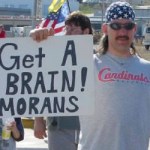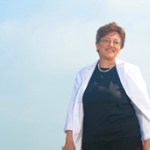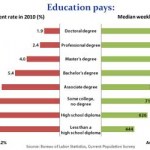education
Yesterday's physics education post kicked off a bit of discussion in a place I can't link to about the usefulness of lectures. Something in that reminded me of an anecdote from my grad school days, that I think is useful, so I'll post it here.
When we were working on the spin-polarized collision experiment, we expected that a certain effect ought to be pretty big, but when we did the experiment, it didn't show up at all. We mentioned this in a talk or poster, and a theorist said "Oh, that's not that surprising."
We had been pretty surprised, so I was sent off to talk to Paul Julienne, one of…
Monty Harper is an Oklahoma musician who writes/performs songs for kids with pro-science messages. You guys helped get his latest CD 'Songs from the Science Frontier' made, but what Monty is known for locally are the 'Born to Do Science' programs he organizes for the Stillwater Public Library! He gets local scientists to come in and speak to kids about their research. I did one a couple months ago on vaccines and it was so much fun (kids are so friggen smart these days, its creepy...)!
Well, until now, these programs were just for kids in the Stillwater area. Now Monty is producing…
As I said last week, I recently wrapped up a term experimenting with "active learning" techniques in the two intro courses I was teaching. The diagnostic test results were a mixed bag-- one section showed really good improvement in their scores, the other was no better than the same class with traditional methods-- and the exam scores weren't really any different. There was probably some slight improvement in the multiple choice-- fewer students got trapped by the Newton's First Law questions than usual-- but in the free-response problems, they did about the same as usual.
So, having turned…
One of the many things I wish I had had time to blog about during the just-completed term was the big New York Times article on attrition in science majors. This generated enough commentary at the time that people are probably sick of it, but I haven't seen anything that exactly matches my take, so I'll belatedly throw this out there.
The big point of the article is that lots of students who enter college planning to major in Science, Technology, Engineering or Math (the "STEM" fields, in an awkward but now inescapable acronym) end up graduating with degrees in something else:
But, it turns…
"Time and money spent in helping men to do more for themselves is far better than mere giving." -Henry Ford
Here in the United States, it's American Thanksgiving, our annual harvest festival. Traditionally, it's the one day out of the year where we spend it with the people most important to us, and give genuine appreciation for the good things we have in our lives. And there is so much to be thankful for.
Image credit: NASA, ESA, and the Hubble Heritage Team (STScI / AURA).
Last year, I gave thanks to the entire Universe, from the smallest subatomic particles and the laws that govern them…
This video was produced to allow scientists to explain, in their own words, the importance of evolution to science -- and the related importance of teaching evolution in schools. Our goal is to convey the fact that evolution is an amazing, uplifting discovery that has served as the genesis of countless advances in many fields of science. We also wanted to highlight female role models in the science community.
For information on what you can do to support evolution in education, please visit these sites. These organizations are not associated with this video in any way, but we think they do…
As noted in previous posts, I've been trying something radically different with this term's classes, working to minimize the time I spend lecturing, and replace it with in-class discussion and "clicker questions." I'm typing this while proctoring the final exam for the second of the two classes I'm teaching, so it's not exactly the end, but nearly everything is in but for the student evaluations, so here are some semi-final thoughts on this experiment:
-- On the whole, I think it went reasonably well, though things definitely flagged toward the end, particularly in the regular mechanics class…
For U.S. workers, the risk of dying on the job is highest if you are employed in agricultural, fishing or hunting. These jobs are not just a little riskier than the average job, they are nearly 8 times more life-threatening. The fatality rate for all private sector workers is 3.5 per 100,000 workers; in agriculture, fishing and hunting, the rate is 26.8 deaths per 100,000 workers. Combine these statistics with age-specific fatality rates and it was time for the US Department of Labor (DOL) to review the adequacy of its safety regulations for children working in farming jobs. The rules…
Teachers teach facts instead of concepts. Teachers teach from the textbooks and barely understand what is in the book anyway. There is not enough hands-on learning. All teachers really do anyway is to show videos most of the time. What should really happen is that a teacher should learn how to do science, intensively, with one project and that way, really understand how to teach it.
And so on and so forth.
If you find yourself agreeing with everything I just said, then I have one more thing to add: Get a brain, moran!
OK, maybe I'm being a little hard on you, but you were asking for it…
Why Engineering Majors Change Their Minds
Why Science Majors Change Their Minds (It's Just So Darn Hard)
Why The Internet of Things Will Be Open
Access or ownership: Which will be the default?
Designing for the phase change: Local communities and shared infrastructure
There is a pathetic lack of functionality in scholarly publishing. We must end for-profit publishing and allow libraries to make available the works of their scholars for all
Retaining the STEM Dropouts
Finding Scholarship and Scholarship Finding Us
Thoughts on 2011 Open Access Week
"We Don't Read That Way"
The Walled Garden…
Welcome to the latest installment in my very occasional series of interviews with people in the scitech world. This time around the subject is Michael Nielsen, author of the recently published Reinventing Discovery: The New Era of Networked Science and prolific speaker on the Open Science lecture circuit. A recent example of his public speaking is his TEDxWaterloo talk on Open Science.
You can follow his blog here and read his recent Wall Street Journal article, The New Einsteins Will Be Scientists Who Share.
I'd like to thank Michael for his provocative and insightful responses. Enjoy…
I was at The Charleston Conference last week, thanks to Mike Diaz of Proquest who invited me to be on a panel that he moderated, along with Karen Downing and Clifford Lynch. The topic of the panel was Keeping Up with the Things That Matter: Current Awareness Tools and Strategies for Academic Libraries. Karen, Cliff and I came up with different takes on the subject but overall the panel was quite well attended and I think useful and interesting for audience members.
Not surprisingly, my take was a bit on the "stealthy librarian" side of things:
I enjoyed being a bit provocative and think…
Before heading off to the Charleston Conference last week, I blogged about the big announcement of Pierre Lassonde's big $25 million donation to York to found the Lassonde School of Engineering.
I attended the announcement and livetweeted it quite extensively: here, here, here, here, here, here, here, here, here, here, here, here, here, here, here, here, here.
I also created a Storify story of a fair bit of the quite extensive twitter traffic of the annoucement and that is here. I've embedded the Story at the end of this post. It's mostly tweeting form the day of the announcement but I have…
In this country, as in much of the Western world, we are constantly bemoaning slipping scores in math and science. So here's a bit of good news: The first 26 science teachers to participate in the Rothschild-Weizmann Program for Excellence in Science Teaching will be receiving their degrees in science education in a few weeks. This M.Sc. program is directed by the Feinberg Graduate School at the Weizmann Institute of Science.*
The idea of the program is simple: To improve science education, invest in the teachers. The Weizmann Institute invited high-school science and math teachers who…
It's a big day here at York University, especially for us science & engineering types both within the Faculty of Science and Engineering and those of us who support their teaching and research missions. There's a big announcement about the coming expansion of our engineering programs to include many of the more traditional streams, such as electrical and others.
The details are being announced today at a news conference at 1pm. I'll be there livetweeting as will others, I imagine.
There was a first announcement a little while back about some government money that was being committed.…
By Dr. Gerry Harp, Senior Astrophysicist, Center for SETI Research, SETI Institute, and Gail Jacobs
Trained as a quantum mechanic, Dr. Gerry Harp was deeply interested in possibilities for using the multiple telescopes of the Allen Telescope Array to generate steerable "beams" on the sky -- beams that could be far smaller than any single antenna could produce. Such beams don't emit anything, but work in reverse by capturing only energy that comes from the sky in a certain direction. Gerry joined the SETI Institute in 2000, practically at the telescope's inception and uses the telescope for…
Suppose you are an intelligent, thoughtful person with a thirst for information, a desire to be challenged, and a tendency to not accept received knowledge at face value. You are embedded in a traditional Christian culture where most of your family, your child's teachers and friends and those friends' families, the people where you and your spouse work and most people in your social circles assume that Evolution is "only a theory" and should be taught, if at all, along side alternative theories such as that the earth is 6,000 years old and was created in seven days. But you don't want that…
"In science, even when you're convinced that you know the right answer, you keep testing your understanding in new ways. You keep looking for phenomena that might do something different than what your best ideas and theories predict. As long as there's a Universe out there to investigate, science doesn't end." -Ethan Siegel
We've talked many times here about how the term theory gets abused by non-scientists, what scientific theories do and do not do, and of course, just yesterday, how important science and scientists actually are for progress in our quest to understand the Universe.
Image…
"No Child Left Behind" was doomed to be a failure, because it was ill concieved, politically cynical, and underfunded. But like the War in Iraq, the Patriot Act and Tax Breaks for the Rich, and all the other initiatives of the Bush Administration that never should have happened, we have been saddled with this melt down of a policy for over a decade. "NCLB" was one of the first policies implemented by Bush.
The evidence that the approaches developed under this policy have failed has been mounting for years, and the supporters of NCLB have been dropping like flies on no-pest strip. The…
"Science is facts; just as houses are made of stone, so is science made of facts. But a pile of stones is not a house, and a collection of facts is not necessarily science." -Jules Henri Poincaré
The higher you fall from, the faster you'll be moving when you hit the ground.
Image credit: Marianne Holland.
Seems like the most obvious thing in the world. You know this intuitively, of course, based on all your experience in the world. Drop an egg from too great a height and it breaks.
While you wouldn't be afraid to jump off of a diving board like the one above, jumping from a greater height…





